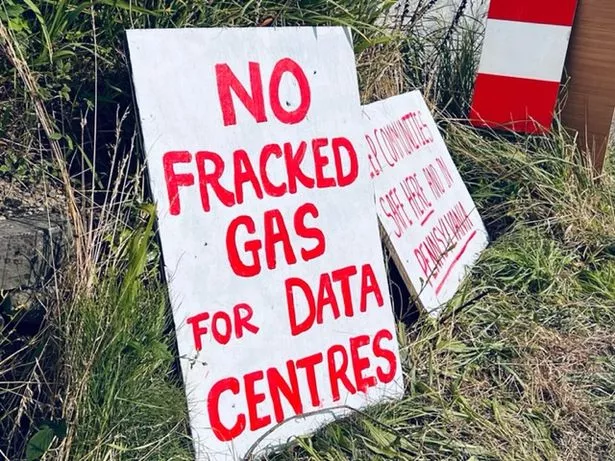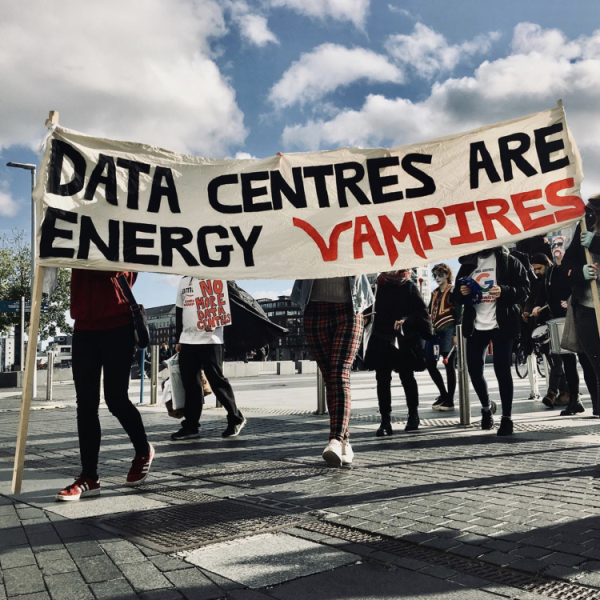The development of a robust and well-integrated information technology sector has been an important part of Ireland’s economic strategy for many decades now – the country’s prodigious development seen since the 1990s has been credited in no small part to success in this particular area. Both computer manufacturers like Apple and internet giants such as Google established major operations here relatively early on in their own development and such operations were generally seen as clean industries, compared with traditional manufacturing, mining etc. The explosive growth of the internet however has generated an enormous demand for energy-intensive facilities that can handle and store the vast amounts of data being created. Already host to most of the world’s tech giants, Ireland’s geographic location at the centre of a nest of undersea cables connecting the US and Iceland to Britain and Europe has resulted in an extremely heavy concentration of data centres here. This development has been rapid, unchecked and we argue completely detrimental to our commitments to combat climate change by reducing our CO2 emissions.
In 2023, data centres in Ireland used 21% of total metered electricity consumption, up from just 5% in 2015. As of June 2024, Ireland had 82 data centres, with a further 14 under construction and planning approved for 40 more. This means that by the end of 2025 it is likely that at least quarter of our electricity supply will be swallowed up by data centres – a fivefold increase in energy demand from this source in just one decade.
This tremendous expansion of infrastructure demands an enormous amount of energy to function and the result has been a massively over-stretched national grid and the very strong likelihood that we will miss our emissions targets. This is in spite of the increased capacity of our renewable energy sector – which provided over 40% of our electricity in 2023. In other words, the over-concentration of facilities handling global data consumption on this small island increases our energy usage to an extent that dwarfs our switch to renewable sources.
“While Ireland is predicted to fall short on our EU climate commitments, we are still seeing encouragement of expanding one of the most energy demanding industries. This cannot continue if we are serious about our commitment to reducing greenhouse gas emissions.”
As the growth of data centres continues, developments in the area of AI herald a greater-still demand for these power-consuming data centres in the immediate future. Altogether this situation warrants far more concern than we are seeing from public representatives at present. Eirgrid’s recent decision to stop new connections in Dubin until an upgrade in the transmission system could be undertaken starkly illustrates the strain our energy system is under but ad hoc responses such as this point to the sore need for a national strategy to address this issue head on.
“With the development of AI, it brings with it an exponentially greater need for these power consuming data centres, the construction of which has already expanded year on year and really warrants more concern than we are seeing from public representatives.”
Far from showing concern however, our government continues to actively promote the construction of data centres. Recent minister for Enterprise Trade and Employment, Simon Coveney, as keynote speaker at the Data Centre Ireland 15th annual convention said:
“The next decade will be transformational for our businesses, economy and society and data centres are at the epicentre of these transformational changes and we must continue to support the future of the Irish data centre industry.”
This once again highlights the government’s focus on the economy and its contracts with large multinational companies over any of its environmental obligations.
In the private sector, there also exists criticism from some on the ‘regulatory hurdles’ that are causing barriers to speedy construction and a call for policy to ‘catch up with demand’.
While many sponsors and connected organisations of the convention were promoters and suppliers of renewable energy sources, the infrastructure we currently have cannot keep up with the pace of expansion of these centres. Furthermore, while it is encouraging to see a massive engagement between energy centres and renewable energy sources, the reality is that the energy needed will still outpace any renewable supplies and negatively impact our important targets for reducing greenhouse emissions. Simply put, we are already predicted to fall far short of meeting our own environmental commitments and the expansion in the number of these centres will leave us falling even shorter.
In light of the current situation and future impact of more data centres in this country, Gluaisesacht is calling for an immediate moratorium on any new data centre developments.




